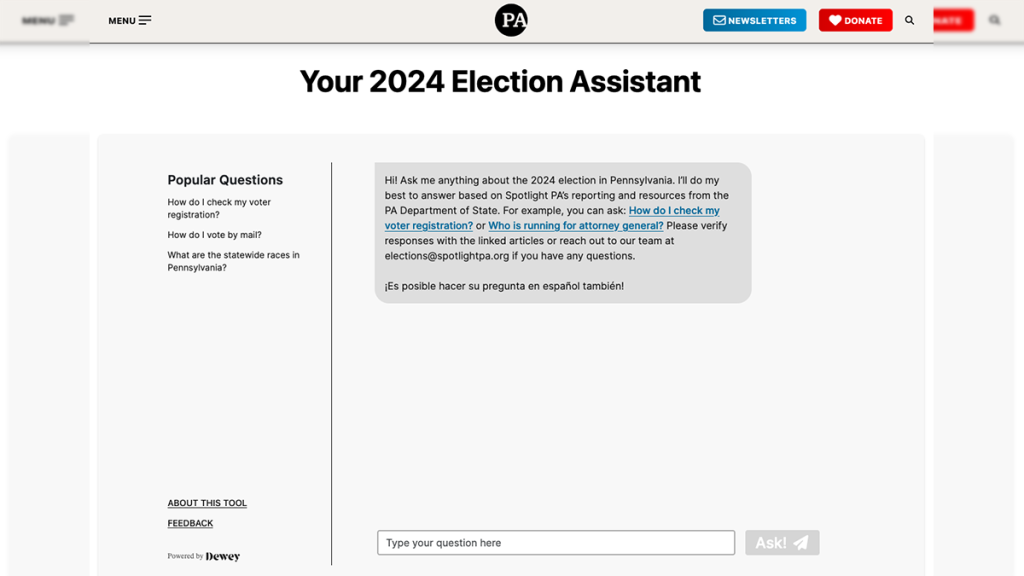
Pennsylvania investigative outlet using AI to keep public informed about general election
Welcome to another installment of “AI is here,” a series from RJI highlighting AI innovation in journalism. In today’s spotlight, one news organization has built a conversational chat program to provide election information to a broader audience without losing its identity in the sea of generative AI
With machine-learning software and large language models now firmly entrenched in society, infused into everything from social media to moviemaking, news organizations are slowly but surely experimenting with ways to incorporate “AI” into newsrooms.
While many of these early trials revolve around generating story and headline suggestions or other time-saving measures with ChatGPT, other organizations — like Spotlight PA, a nonprofit investigative journalism outlet covering Pennsylvania state government — are acting more ambitiously, harnessing AI to connect more deeply with the communities they serve.
Spotlight PA has now released a conversational chat interface that can provide answers to common questions about the upcoming general election, offering information about candidates and relevant issues. In collaboration with AI-powered assistant Dewey (which is behind another AI chat program that helps people find answers about parenthood and related issues), the goal is not to create content, but to make Pennsylvania-related election information more centralized and instantly accessible to audiences.
“This is an application of AI that is not about replacing anything our reporters are currently doing, but really figuring out how we get that work they’re doing into more people’s hands,” said Christina Bruno, digital growth strategist at Spotlight PA.
The chat will soon appear at the bottom of election related articles, allowing readers to ask questions that expand on or differ from the story they are reading. Someone browsing an article about a Pennsylvania General Assembly election, for example, might ask about the process of filing mail-in ballots for the presidential election, creating a more flexible, audience-driven approach to informing the public.
It’s a spark of innovation in an industry environment that some consider too hesitant to try new things, especially when it comes to AI. David Caswell, a former executive product manager at BBC News who helps news organizations implement AI workflows, said much of the industry is leaving huge potential on the table.
“The U.S. and the UK are weirdly stagnant in applying AI to journalism,” Caswell said, noting that he has seen impressive leadership in the field coming from places like Zimbabwe, South America and Nordic countries, to name a few. “It’s not like nothing’s happening, but on a relative basis considering the opportunities, there’s something missing.”
Some of the potential obstacles are quite clear: Spotlight PA’s project comes at a time when public trust in U.S. news organizations sits at record lows, political divisions around the country are deepening as local news deserts expand and AI, though increasingly embraced, remains a source of anxiety among those who fear their jobs could be replaced by the newest wave of automation.
If done poorly, it’s easy to imagine an election-centered chat program inflaming some or all of these tensions. That’s why Spotlight PA sought to create a firmly leashed tool that, far from being a simple re-skin of ChatGPT, is trained on the news organization’s own election coverage and is not given much leeway to get creative with answers to unexpected or inappropriate questions.
“There has been a lot of human oversight and input in the process,” Bruno said. “It will be really important for us to communicate that, and that is one of the things we’ve learned even in the testing process — there is a lot of context that we need to provide around it.”
Much of that context involves explaining the scope of the tool. Born from Spotlight PA’s election coverage, which is focused on statewide races and a few relevant national races, the chat won’t yet give you detailed information catered to your zip code or fill you in on past races. From the start, it was designed as an extension of the outlet’s coverage, a means of reaching more people without sacrificing the specificity and accuracy of its content.
This focus allows Spotlight PA to use ChatGPT in a way that limits the scope of its training data and makes AI one element of the tool, not its entirety. Compared to tools that simply feed content into ChatGPT without limitations, the more customized approach is intended to reduce the likelihood of errors. Spotlight PA also enlisted the help of a Pennsylvania university to “red-team” the tool, further minimizing the risk of inaccuracies.
Bruno said early user feedback has enthusiastically praised the ability to get answers quickly, with some applauding the experience of finding answers to questions they didn’t even know they had. Still, the wild swings of this election season have also demonstrated the inherent difficulty of building a tool that provides facts about something as chaotic and ever-changing as the U.S. general election.
In late July, for example, as the team was nearing the finish line in the development process, President Joe Biden dropped out of the presidential race. This, on top of legal challenges to the state’s mail-in voting process, necessitated frequent updates to the news outlet’s content to ensure the chat tool could provide the most up-to-date information.
Bruno said that while there have been challenges in the development process, news organizations can view that process as a learning experience that feeds the newsroom as a whole, not just one particular tool. Instances in early testing when the chat failed to answer a good, relevant question, for example, proved enlightening.
“This has really helped us understand what questions people have that we have not yet been able to answer with our reporting,” Bruno said. “It has implications for how we think about SEO — how the questions that we’re seeing might translate into search engines more broadly.”
Bruno added that if the chat is a success, the outlet will likely pursue other opportunities to integrate AI into its coverage of state and local government.
Those interests in learning more can reach out to elections@spotlightpa.org.
Stay tuned to rjionline.org for more spotlights on AI innovation.
Cite this article
Fitzgerald, Austin (2024, Oct. 16). Pennsylvania investigative outlet using AI to keep public informed about general election. Retrieved from: https://rjionline.org/news/pennsylvania-investigative-outlet-using-ai-to-keep-public-informed-about-general-election/

